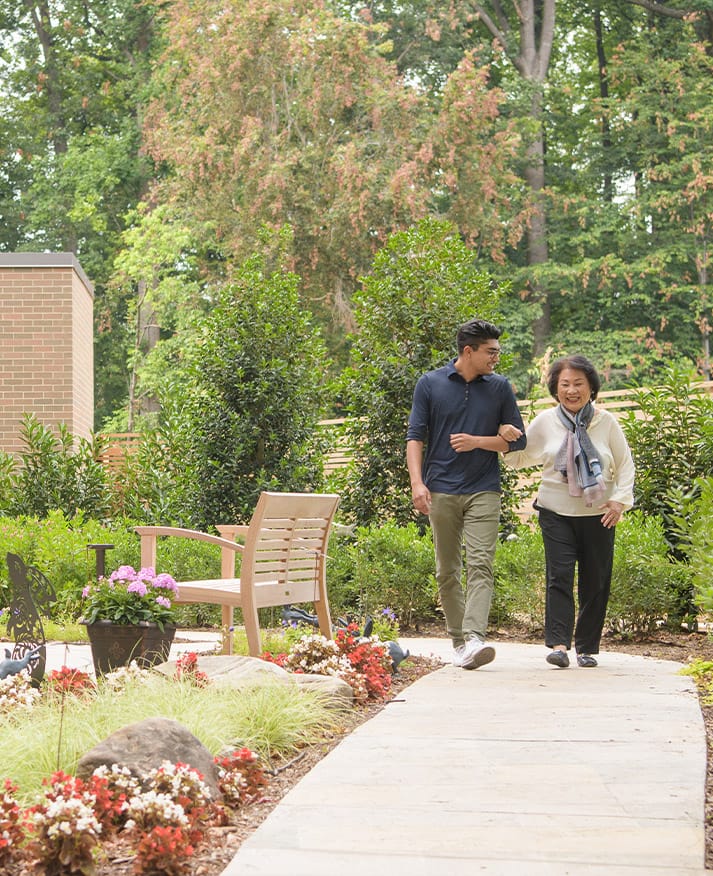Engagement Matters
The importance of staying connected in dementia care.
For individuals living with dementia, staying engaged in daily life isn’t just beneficial — it’s essential. Engagement provides a sense of purpose, preserves cognitive function, and fosters emotional well-being. Yet, as dementia progresses, maintaining these meaningful connections can become more challenging.
At Watermark Retirement Communities, we believe in the power of engagement and its ability to enrich the lives of those experiencing memory loss. Whether through creative expression, social interactions, or sensory stimulation, finding ways to keep the mind active and the heart connected can make all the difference.
Here’s why engagement matters in memory care and how it profoundly enhances well-being.
1. Engagement Stimulates the Mind and Encourages Cognitive Well-Being
Cognitive decline is one of the most well-known challenges of dementia, but research shows that active engagement can help slow its progression and improve quality of life. Mental stimulation, whether through structured programs or everyday interactions, plays a critical role in maintaining cognitive function for as long as possible.
The Science Behind Engagement and Brain Health
Studies have shown that participating in mentally stimulating activities can strengthen neural connections, helping the brain remain more resilient despite cognitive decline. According to the Alzheimer’s Association, puzzles, music therapy, storytelling, and even social conversations can help keep the brain engaged and create a sense of familiarity or routine.
Ways To Support Cognitive Well-Being
- Creative Expression: Art, music, and storytelling allow individuals to express themselves in ways that go beyond words.
- Memory-Boosting Activities: Word games, trivia, or reminiscence therapy encourage recall and help maintain cognitive function.
- Daily Routines With Purpose: Simple tasks like folding laundry, watering plants, or setting the table allow individuals to engage in familiar, meaningful routines or hobbies.
By encouraging daily participation in things that challenge the brain, we can help individuals with dementia maintain cognitive strength and a sense of accomplishment.
2. Engagement Helps Reduce Stress and Anxiety
Dementia can bring about emotional challenges, including increased agitation, confusion, and anxiety. However, consistent engagement in enjoyable and familiar activities can provide comfort, reduce stress, and create a calming routine.
The Link Between Engagement and Emotional Well-Being
Routine and familiarity play an essential role in reducing anxiety for those living with dementia. Participating in meaningful experiences helps establish a sense of structure, providing security and reducing feelings of confusion or unpredictability.
Activities That Promote Emotional Balance
- Music Therapy: Listening to familiar songs or playing instruments can soothe nerves and evoke positive emotions. Research indicates that music can improve mood and even trigger memories for some people living with dementia.
- Physical Movement: Gentle exercises like stretching, chair yoga, or walking provide an outlet for restlessness and support emotional balance.
- Sensory Stimulation: Tactile experiences such as aromatherapy, hand massages, or textured crafts can bring comfort and reduce stress.
By incorporating engagement into daily routines, caregivers can create a nurturing atmosphere that minimizes distress and promotes a sense of security and joy.
3. Engagement Encourages Social Interaction and Strengthens Connections
Isolation can be one of the most challenging aspects of dementia, both for individuals experiencing memory loss and for their families. Human connection remains essential at every stage of life, and staying socially engaged helps prevent loneliness, supports communication, and fosters emotional bonds.
Why Social Engagement Matters in Memory Care
People living with dementia may struggle to initiate conversations or remember details about loved ones, but that doesn’t mean they stop valuing human connection. Research suggests that social interactions can slow cognitive decline and enhance overall well-being.
Ways To Foster Connection
- One-on-One Conversations: Even brief, meaningful conversations can help individuals feel valued and heard.
- Group Activities: Games, sing-alongs, and communal meals encourage a sense of belonging.
- Intergenerational Engagement: Visits with children or pet therapy programs can bring comfort and joy in a way that words sometimes cannot.
At Watermark, we recognize the power of social engagement in memory care. Whether through individualized engagement or group programs like Watermark University, fostering connections remains at the heart of our approach.
4. Engagement Supports Physical Health and Mobility
Dementia doesn’t just impact the mind — it can also lead to physical decline, affecting balance, coordination, and overall mobility. Regular physical activity, whether through structured exercise or simple daily movements, can help maintain strength, reduce the risk of falls, and promote overall well-being.
How Physical Movement Helps Individuals With Dementia
- Maintains Muscle Strength: Simple movements, like stretching or light resistance exercises, help prevent muscle weakness and improve mobility.
- Improves Circulation and Heart Health: Regular movement enhances blood flow, reducing the risk of cardiovascular issues.
- Encourages Better Sleep: Physical activity can help regulate sleep patterns, reduce restlessness, and improve overall sleep quality.
- Reduces the Risk of Falls: Balance-focused exercises and gentle stretching can help prevent falls, which are a common cause of injury in older adults with dementia.
Ways To Encourage Movement
- Guided Chair Exercises: Seated stretching or yoga helps maintain flexibility while minimizing fall risk.
- Dancing and Rhythmic Movement: Music-based movement, such as dancing or clapping to a rhythm, is both engaging and beneficial for motor function.
- Outdoor Walks or Gardening: Spending time in nature provides physical movement while stimulating the senses.
By incorporating gentle physical activities into daily routines, individuals with dementia can stay mobile and comfortable for longer, improving their overall quality of life.
5. Engagement Helps Preserve a Sense of Identity and Purpose
A dementia diagnosis does not define a person. Each individual has a lifetime of experiences, passions, and personal stories that deserve to be honored and celebrated. Engagement in familiar and meaningful experiences can help maintain a sense of identity, dignity, and self-worth.
Why Purpose Matters in Dementia Care
- Boosts Self-Esteem: Individuals feel accomplished and valued when they engage in familiar routines.
- Triggers Positive Memories: Revisiting old hobbies, such as painting, knitting, or baking, can spark recognition and joy.
- Provides a Sense of Routine: Structured activities help establish predictability, which can be calming for individuals with dementia.
Ways To Support a Sense of Purpose
- Personalized Activity Plans: Encourage participation in hobbies that align with a person’s past interests.
- Reminiscence Therapy: Looking at old photos, listening to favorite songs, or discussing cherished memories can reinforce identity and connection.
- Small Acts of Contribution: Folding laundry, setting the table, or helping with gardening allows individuals to continue contributing in meaningful ways.
When engagement is tailored to a person’s history and passions, it fosters participation and a deep sense of fulfillment and dignity.
Engagement in dementia care is more than keeping busy — it’s about stimulating the mind, supporting emotional well-being, maintaining social connections, promoting physical health, and preserving identity. Each of these elements plays a crucial role in enhancing the quality of life and ensuring that individuals living with dementia continue to experience moments of joy, purpose, and connection every day.


